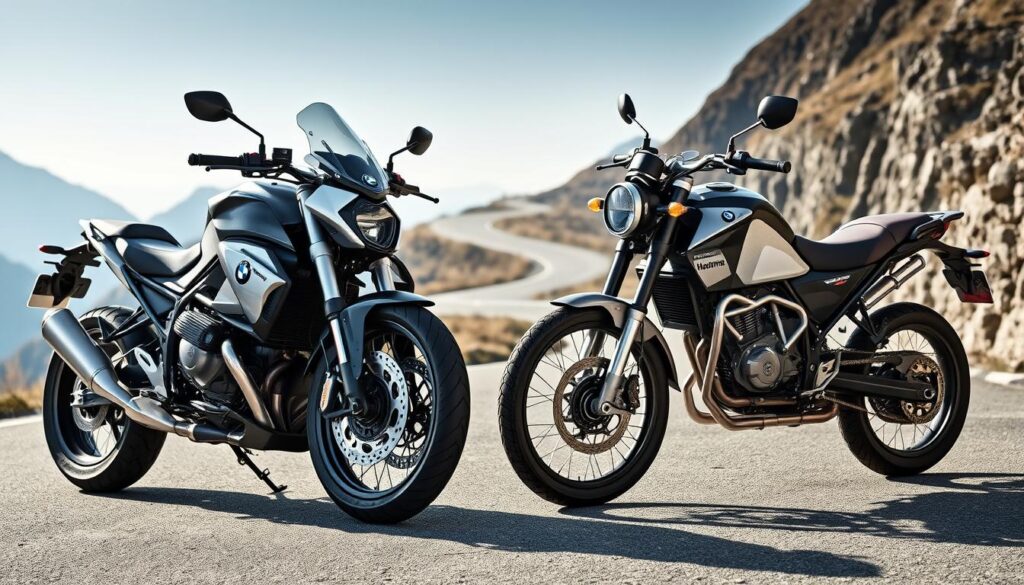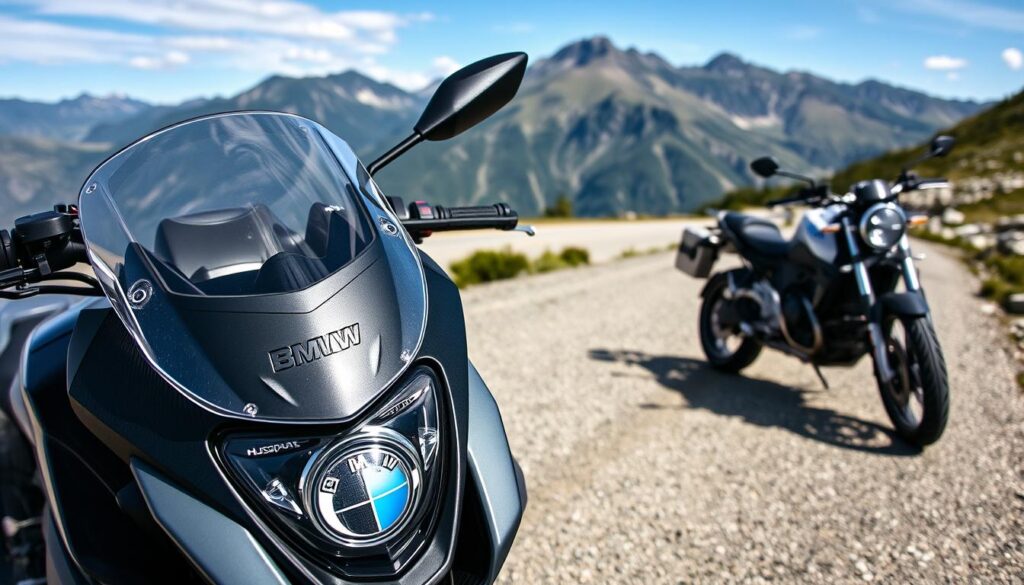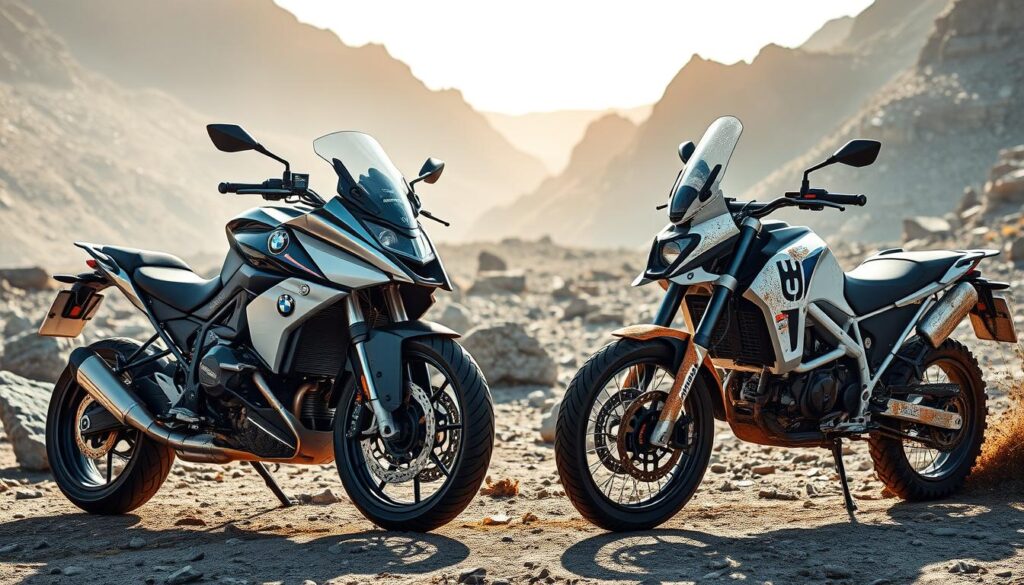In the world of motorcycles, performance and reliability are key. Riders want bikes that last a long time. The rivalry between BMW and Husqvarna has grown as they compete to be the most durable.
Can BMW’s high-end build beat Husqvarna’s off-road skills? Let’s look at what makes a motorcycle last. We’ll see which brand can truly stand the test of time.
Key Takeaways
- Evaluate the design and engineering philosophies of BMW and Husqvarna motorcycles.
- Assess the build quality and materials used in each brand’s vehicles.
- Analyze the factors that contribute to long-term durability and reliability.
- Explore the performance and off-road capabilities of BMW and Husqvarna models.
- Discover insights from owners on the real-world experiences with these motorcycles.
Introduction to BMW and Husqvarna Motorcycles
BMW and Husqvarna are famous motorcycle brands with their own stories. BMW started in 1916 and is known for top-notch engineering. Husqvarna, founded in 1689, excels in off-road and endurance racing.
Brief History and Background of the Two Brands
Husqvarna motorcycles were big in the 70s and 80s for off-road and endurance. They have a long history, starting with motorcycles in 1903.
BMW’s Acquisition of Husqvarna in 2007
In 2007, BMW bought Husqvarna to bring it back to life. They wanted to use Husqvarna’s off-road skills. This move led to new ideas, better technology, and stronger sales for both brands.
In 2012, the Husqvarna Nuda 900 and Nuda 900 R won the Red Dot Design Award. BMW is keeping Husqvarna’s engine options alive. They focus on performance, handling, and safety.
Husqvarna offers bikes for Motocross, Supermoto, and Enduro. Engines range from 50cc to 611cc. BMW’s help aims to keep Husqvarna’s spirit alive while adding their own expertise.
BMW’s influence on Husqvarna is to keep its legacy alive. They want to make sure both brands have a strong future in motorcycles.
Comparing Design and Engineering Philosophies
BMW and Husqvarna are two top motorcycle makers with different design and engineering views. BMW is known for its high-quality, innovative bikes that perform well on the road. Husqvarna, meanwhile, focuses on off-road and endurance, making bikes that are light and perform well.
BMW’s Approach to Motorcycle Design and Manufacturing
BMW values precision and advanced tech in its bikes. Their motorcycles are smooth, powerful, and built to last. BMW’s design mixes looks and function, making bikes that are both beautiful and well-made.
BMW is serious about quality and uses top materials in its bikes. They keep improving with features like electronic aids, advanced suspension, and new powertrain tech.
Husqvarna’s Legacy and Off-Road Expertise
Husqvarna is all about off-road motorsports. Their bikes are light, agile, and powerful, perfect for off-road adventures. Husqvarna’s bikes are known for their great handling and performance.
Husqvarna focuses on making bikes that are fun to ride off-road. They design bikes that are light, have great suspension, and are tough. This has made Husqvarna a favorite among adventure and off-road riders.

| Feature | BMW Approach | Husqvarna Approach |
|---|---|---|
| Design Priority | Premium quality, innovative technology, on-road performance | Lightweight construction, performance-oriented design, off-road capability |
| Engineering Focus | Precision, attention to detail, advanced technologies | Lightweight, robust components, optimized suspension |
| Manufacturing Processes | High-quality control, use of premium materials | Emphasis on weight reduction, durability in off-road conditions |
| Rider Experience | Smooth, powerful, and responsive on-road performance | Thrilling, agile, and confidence-inspiring off-road capabilities |
Knowing the design and engineering differences between BMW and Husqvarna helps riders choose the right bike. It’s about understanding what each brand offers and what suits your riding style best.
Evaluating Build Quality and Materials
Motorcycle durability depends a lot on build quality and materials. BMW is known for its top-notch craftsmanship. They make motorcycles that last a long time. Their use of durable parts and careful manufacturing sets them apart.
BMW’s Reputation for Premium Construction
BMW focuses on every detail in making its motorcycles. They use the latest manufacturing methods and pick the best materials. This ensures each bike meets BMW’s high standards.
From the strong frame to the precise engine, BMW bikes are built for durability. They handle daily rides and off-road adventures well.
| Specification | BMW | Husqvarna |
|---|---|---|
| Motorcycle Build Quality | Renowned for premium construction and attention to detail | Known for its off-road expertise, but construction quality may vary |
| Materials Used | High-quality, durable components sourced from reputable suppliers | Utilizes a mix of materials, with a focus on lightweight design |
| Manufacturing Standards | Strict quality control processes and advanced production techniques | Varies depending on the specific model and manufacturing location |
| Durability of Components | Designed to withstand the rigors of everyday use and off-road conditions | May not be as robust as BMW motorcycles, but still suitable for off-road use |
BMW’s focus on detail and premium materials makes their bikes last long. This is why many riders choose BMW for reliable and fun rides over the years.
Can BMW Beat Husqvarna in Long-Term Durability?
The question of long-term durability is key for motorcycle fans today. BMW and Husqvarna, two top brands, are in a fierce battle for the best long-term performance.
To understand their durability, we must look at several important factors. These include design, engineering, build quality, and materials. Each one affects how long and reliable these motorcycles can be.
| Factors Affecting Durability | BMW | Husqvarna |
|---|---|---|
| Design and Engineering Approach | BMW focuses on precision and detail, making its bikes last longer. | Husqvarna’s off-road background and tough design suggest it’s built to last. |
| Build Quality and Materials | BMW uses top-notch materials and advanced tech for durability. | Husqvarna’s off-road focus and rugged design show it’s built to last. |
| Maintenance and Service | BMW has a wide service network and clear maintenance guides. | Husqvarna makes maintenance easy, helping its bikes stay reliable over time. |
Looking at these factors, we can see BMW might have an edge in durability. But, real-world tests and owner feedback are crucial to know for sure.

“Durability is not just about the initial build quality, but also the long-term performance and resilience of a motorcycle in the face of everyday use and abuse.”
As we dive deeper into BMW and Husqvarna’s durability, a detailed look at their design, engineering, and performance is key. This will help us see who comes out on top in this exciting competition.
Motorcycle Reliability and Longevity
Several factors affect motorcycle reliability and long-term durability. The quality of materials and the motorcycle’s design are key. These elements help it last longer with regular use. When comparing BMW and Husqvarna motorcycles, knowing these factors is crucial.
Factors Affecting Long-Term Durability
Engine design and construction are major factors in reliability. The BMW F800GS’s 798cc parallel twin engine is powerful and durable. Electrical systems, like the 400-watt stator in the BMW F800GS, also matter. They provide enough power for accessories and help the battery last longer.
The size of a motorcycle’s fuel tank is another important factor. The BMW F800GS Adventure’s 6.3-gallon tank allows for longer rides. This means fewer stops for fuel, which is great for off-road adventures.
| Motorcycle Model | Engine Displacement | Fuel Tank Capacity | Stator Output |
|---|---|---|---|
| BMW F800GS | 798cc | 6.3 gallons | 400 watts |
| Suzuki DL650 V-Strom | 645cc | 5.8 gallons | 375-400 watts |
| BMW F650GS / Dakar | 652cc | N/A | 400 watts |
Quality suspension, a strong frame, and careful manufacturing also matter. The environment, maintenance, and riding style can affect a motorcycle’s life span. These factors help determine how well BMW and Husqvarna motorcycles last over time.
Understanding these elements gives us insights into BMW and Husqvarna’s long-term performance. This helps us see which brand is more durable in the long run.

Performance and Off-Road Capabilities
BMW has made big strides in motorcycle performance and off-road tech for adventure riders. The BMW F800GS Adventure is a prime example of this. It’s lighter than the R1200GS but handles better.
The bike’s 85 horsepower engine and 9.1-inch front and 8.5-inch rear suspension travel make it smooth on rough terrain. Its “Enduro Mode” for traction control and ABS boosts off-road performance. This lets riders confidently ride on unpaved roads and trails.
| Motorcycle | Engine Displacement | Horsepower | Torque | Wet Weight | Suspension Travel (F/R) |
|---|---|---|---|---|---|
| BMW F800GS Adventure | 798cc | 85 hp | N/A | 505 lbs (230 kg) | 9.1 in (230 mm) / 8.5 in (215 mm) |
| Yamaha Ténéré 700 | 689cc | 72 hp | 50 ft-lbs | 450 lbs (204 kg) | 8.3 in (210 mm) / 8.3 in (210 mm) |
| KTM 890 Adventure R | 889cc | 105 hp | 73 ft-lbs | N/A | 9.4 in (240 mm) / 9.4 in (240 mm) |
| Ducati DesertX | 937cc | 110 hp | 68 ft-lbs | N/A | 8.7 in (220 mm) / 8.7 in (220 mm) |
The F800GS Adventure is impressive, but rivals like the Yamaha Ténéré 700 and KTM 890 Adventure R have better power-to-weight ratios. The Ducati DesertX also shows the potential of high-performance midweight adventure bikes with its 110 horsepower and 68 foot-pounds of torque.
BMW’s focus on off-road tech makes the F800GS Adventure a capable and versatile bike. However, competitors keep pushing the limits of what’s possible in adventure motorcycles.

Service and Maintenance Considerations
Long-term motorcycle ownership means more than just the initial quality. The ease and cost of upkeep are key. BMW and Husqvarna both provide motorcycle service and maintenance requirements to keep your bike running well. But, parts, dealer support, and warranty coverage can greatly affect your owner satisfaction.
BMW is known for its high-quality and detailed work. This usually means easier access to parts and better dealer support. Their service centers are ready to handle all your bike’s needs, with warranty coverage for peace of mind.
Husqvarna, on the other hand, has a strong off-road background. This might make finding parts and dealer support harder. Yet, their bikes are built to last and need less maintenance, which can balance out any issues.
| Feature | BMW | Husqvarna |
|---|---|---|
| Parts Availability | Excellent | Good |
| Dealer Support | Extensive | Moderate |
| Warranty Coverage | Comprehensive | Competitive |
| Maintenance Requirements | Moderate | Low |
| Owner Satisfaction | High | Good |
Choosing between BMW and Husqvarna depends on your needs and preferences. Think about service and maintenance when deciding. This will help you choose the right bike for your long-term goals and ensure a smooth ride.

Owner Experiences and Reviews
Owner feedback is key when looking at BMW and Husqvarna motorcycles. It shows us how these bikes perform over time. Reviews from long-time riders help us understand what makes these motorcycles great or not so great.
Insights from BMW and Husqvarna Motorcycle Owners
BMW owners love the brand’s top-notch build and lasting dependability. The BMW K 1600 B is especially praised for its powerful engine and fuel efficiency. It gets about 40 mpg and has a big 26.5-liter tank, giving riders up to 240 miles on a single tank.
Husqvarna, however, has faced some issues with durability. The Husqvarna TC449, for example, had problems with parts quality and durability. One owner sold it after just 6 months, losing $5,800.
“The Husqvarna TC449 was a real disappointment. It was hard to work on, the parts didn’t seem to last, and I ended up taking a huge loss when I sold it. I’ll stick to BMW from now on.”
But, Husqvarna’s newer models like the Terra and Strada have gotten better reviews. Owners like their sporty and off-road performance. They even compare them favorably to the Suzuki DR650.
In the end, it’s clear that both brand reputation and real-world performance matter. BMW is known for reliability, but Husqvarna is working to improve. This shows that Husqvarna is trying to make better bikes for riders.
Future Developments and Innovation
BMW is leading the way in motorcycle design and engineering. The revival of the Husqvarna brand is exciting. This partnership will bring new technology and sustainable ideas to the industry.
BMW’s Plans for Husqvarna’s Revival
BMW bought Husqvarna in 2007, setting the stage for its comeback. BMW’s engineering skills and Husqvarna’s off-road history will merge. This will create innovative bikes that honor the brand’s past.
New Husqvarna models will have BMW’s latest engine technology. The 145-horsepower boxer engine in the R 1300 GS Adventure is a great example. It promises top performance and durability for adventure riders.
Sustainability is key in Husqvarna’s revival. The brand aims to meet the need for green transportation. Look for eco-friendly materials, better energy use, and new fuel options soon.
Husqvarna is set to become a strong player in the motorcycle world again. It will offer innovative tech, off-road prowess, and a focus on the environment.
Brand Reputation and Customer Loyalty
For motorcycle brands, their reputation and customer loyalty are key to success. BMW and Husqvarna stand out with their unique brand identities. These identities greatly affect how appealing and lasting their motorcycles are.
BMW is known for its top-notch engineering and quality. This has made it a favorite among riders who look for the best in performance and quality. The brand’s drive for innovation has earned it many awards, including five category awards in Carbuyer and DrivingElectric awards.
Husqvarna, on the other hand, is famous for its off-road motorcycles. This has built a strong reputation among adventure and enduro fans. Its machines are known for their ability to handle tough terrain, making it a brand with a loyal customer base.
| Brand Reputation | Customer Loyalty |
|---|---|
|
|
The reputation and loyalty of BMW and Husqvarna will greatly affect their motorcycles’ appeal. As riders look for durable and reliable bikes that match their values, these brands’ strengths will be crucial. This will help them stay successful and relevant in the market.
Conclusion
After a detailed look at BMW and Husqvarna motorcycles, we see both brands have their own strengths. BMW is known for its top-notch construction and off-road tech. On the other hand, Husqvarna is famous for its off-road skills and reliability.
The durability and riding experience of these bikes depend on several things. These include the materials used, how well they’re made, and how easy they are to fix. Both BMW and Husqvarna aim to make bikes that last and perform well. But, the best choice depends on what each rider wants and needs.
Whether BMW beats Husqvarna in durability is a tough question. Riders in Australia looking for a reliable bike should think about each brand’s strengths. They should also consider their own riding needs. This way, they can choose a bike that fits their long-term plans.



